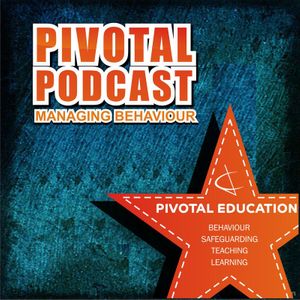How to Train, Retain and Research with Dr. Phil Wood – PP147
Pivotal Podcast - Un pódcast de Pivotal Education

Categorías:
Dr. Phil Wood is a former geography teacher, subject leader and AST and is now at the School of Education at Leicester University. His research is about changing pedagogy and challenging organisations and teachers to look at their pedagogy. Phil is also an associate trainer with Independent Thinking. Accountability Phil is concerned that a lot of schools are now driven by numeric data and senior leadership teams are concentrating on accountability rather than being part of the extended group of teachers. He would prefer to see accountability being more community-led rather than being driven by improvement targets based exclusively on exam data. He thinks this is partly due to the ways in which headteachers are judged at the moment – a bit like football managers – by their most recent set of results. Phil advocates a more nuanced and multi-channel approach which takes account of much more long-term aspects. What is the ‘what works’ agenda and what’s wrong with it? Phil explains that the ‘what works’ agenda is based on the flawed premise that there are ‘end of the rainbow’ solutions to all the issues around pedagogy. If only we can find them, they will present us with all the solutions to our problems. This is shown in the recent fetish for randomised control trials and certain elements of systematic reviews. Once you understand ‘what works’ it can then be applied to all contexts and thus the whole job of pedagogy becomes quite simple. Phil sees this massive reduction of complexity as impossible. It’s not chaotic – you can see patterns and work out what approaches have the best chance of working well but the place of the teacher is always to mediate this – to work out which of the better-evidenced ideas are going to work in their context. The way this has been implemented in recent years – to attempt to create speedy change – has meant that nothing has the time it needs to be embedded, monitored and analysed. How do we give teachers in training access to the thought processes of expert teachers? Phil has been involved in trying to embed lesson study into teaching practice. Because of time and other pressures, student teachers can be ‘running parallel’ to the department they are in. They tend to be planning alone and maybe getting a little feedback on their plans from their mentor but then they go back into working by themselves. To counter this, Phil had the mentor and student teacher working much more closely together. Lessons were taught in threes – the first by the mentor which the pair would then evaluate and plan an amended version for the student teacher to deliver to a parallel group. Thus, the expert teacher was opening up their own thought processes to give the student involvement in and access to them. The student is part of the discussion and learning a whole raft of different aspects of the lesson planning and delivering process from the expert teacher. This makes it much easier for the expert teacher to share their experience where they might find it much more difficult to explain in a de-contextualised manner. Feedback from students teachers has been very positive as they feel involved in the process and are learning a great deal from the expert teachers. The expert teachers are also happy with the process because they can gain new ideas fro the students and also develop their own practice by having the opportunity to analyse it for this purpose. Are teachers too busy to engage in research beyond their classroom? Phil points out there are different kinds of engagement in research from reading digests to engaging in practical classroom-based research. There has been a reduction in those who feel able to be involved in research as the pressures of teaching have grown in recent years. However,